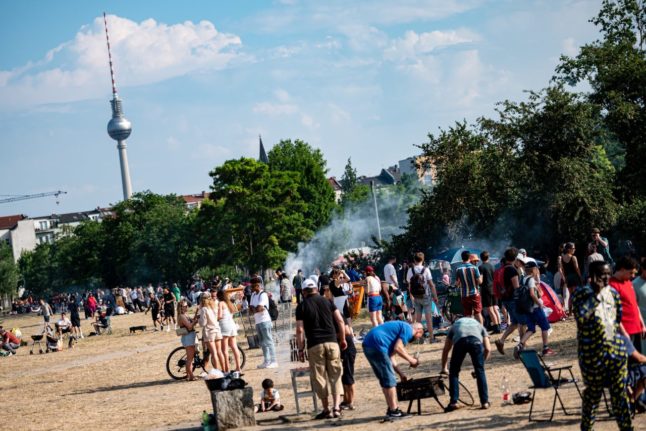Germany is a target destination for an exponentially growing number of students today. According to a recent study by the Deutscher Akademischer Austauschdienst (DAAD), it attracts the largest number of foreign students, after the US and UK. Among its high quality of education, advanced teaching resources and international networks, the cherry on the cake is the fact that there are no tuition fees.
Rather, a Semesterticket of approximately €300 goes towards covering costs of public transport, local passenger trains, and a culture ticket. Prices of theatre shows, opera and cultural clubs are heavily reduced by the culture ticket – and are often simply free to enter.
In Graphs: Number of international students in Germany quickly growing
Finding the best program
Germany boasts of its own version of the Ivy League, led by Heidelberg University and the Technical University of Munich, with Free University of Berlin and Albert Ludwigs University of Freiburg following close behind. A more detailed look at the world rankings by subject is available here.
Accordingly, the Association for German Science and DAAD has put together a list of some of the top international Master’s programs in Germany.
Freie Universität Berlin (together with HU Berlin und Universität Potsdam): Master of Arts “International Relations”
Freie Universität Berlin: East European Studies Online
Universität Bonn: Agricultural Sciences and Resource Management in the Tropics and Subtropics (ARTS)
Universität Dortmund: Spatial Planning for Regions in Growing Economies (SPRING)
Universität Freiburg: Master of Arts in Social Sciences
Universität Göttingen: International Master’s “Molecular Biology“ and “Neurosciences”
Universität Jena: International Master’s “German as a foreign language”
Hochschule Mannheim: Master of Science in Informationstechnik
Hochschule Pforzheim: Master of Business Administration (MBA)
Universität Weimar: Public Art and New Artistic Strategies
Hochschule Mannheim. Photo: DPA
Each academic year in these universities comprises of two semesters, a winter semester (October 1st-March 31st) and a summer semester (April 1st-September 30th), with the exact dates depending on the university. All programs accept applications for the winter semester. Some, such as RWTH Aachen University, offer admission in summer too.
If you are yet unsure of your interests and want to explore the possibilities with an open mind, play around at this excellent portal created by DAAD for international programs available in 2018/2019.
The most important documents
Your CV is the most essential document and should make a quick, solid impression. Spruce it up before you shoot off applications – and don’t forget to proofread! Academic certificates can be uploaded as PDFs but it is important to obtain translated copies if the certificate was awarded in a local language. All such translations must, of course, be certified by competent authorities.
Other crucial documents generally include a copy of your passport, letters of recommendation, letter of motivation, and a high-quality photo. GRE is rarely requested by German universities – here again RWTH Aachen University falls through as an exception.
Proof of proficiency in German or English needs to be demonstrated depending upon the language of instruction. International programs use results from an IELTS or TOEFL test as standard documents for English. If your entire education was conducted in English, some programs may accept that as sufficient proof. Other German-based programs typically require a C2-level certificate from the Goethe Institute (or corresponding level) to enroll.
The application will then require you to answer a few questions that validate your interest in the program. Based on this elementary information, you may qualify for further written tests and personal interviews – including so-called oral exams which grill you on your language skills and subject knowledge.
Most international applications are handled via a user-friendly, online portal called uni-assist.
Funding opportunities
Germany offers monetary support to international students in the form of scholarships, grants and loans. Specialized, competitive programs such as the International Max Planck Research School (for Neurosciences, Molecular Biology and 58 others) and the Erasmus Mundus Joint Degree programs, ranging from space science to journalism, provide their own scholarships under which most to all selected students are covered. DAAD also offers scholarships to internationals who have lived in Germany for not more than 15 months.
As a talented individual, any student in Germany can also benefit from the Deutschlandstipendium regardless of their nationality. Despite its name, this is indeed a grant. With €300 per month awarded for a minimum of two semesters, it definitely does not cover basic living expenses but can be a generous bonus for student life.
At present, Germany estimates a minimum of €720 per month for basic sustenance (including rent, health and liability insurances, food, and limited luxuries) and is mandated as a legal requirement to enter the country. This amount can be shown as a lumpsum saving in a bank statement or guaranteed through a source of regular income.
It is possible to get a study loan from banks, private companies and the government. Bundesausbildungsförderungsgesetz (BAföG) is the primary source of such financial assistance for residents of Germany. EU citizens must therefore move to Germany before they can apply for the partial grant-partial loan – and so must non-EU citizens.
The award value is calculated on the basis of filial income and realistic needs and is determined in each case individually. The BAföG is a partial loan because 50% of its received value must be paid back without any interest, up to five years after graduation.
Popular banks, too – such as Sparkasse – have a special tie up with Göttingen University that enables students to receive €600 per month without disclosing personal income. The repayment of this educational loan can be deferred for up to two years after graduation. Similarly, a Bildungskredit can be earned atop the BAföG.
Learning German
While most schools of higher education conduct their programs in English, the German language is an integral part of interacting with the locals. While it is entirely possible to get by in bigger cities and university towns without learning much of the language, be aware that it will limit the extent of your interactions, and cap your potential to integrate with German-speaking friend circles.
All forms of official correspondence occurs in German too: letters from the bank, health insurance company, Rathaus (town hall), Deutschlandradio (contacting you to pay the broadcast fee, or GEZ) and doctors (with medical bills and test results).

A collection of 'Rathäuser' from Braunschweig, Wolfsburg, Göttingen and Hannover. Photo: DPA
Knowing this well, all universities run language courses beyond office hours. If you want to get a head start learning German from home, there are lots of different apps or sites that offer fun and comprehensive small-group classes for all levels. Additionally, slow news reporting podcasts and freely available cartoons on YouTube can help master the basics too. I personally recommend exploring children’s books to learn the art of constructing basic sentences.
SEE ALSO: 8 simple reasons why learning German is really worth your while
Find the expats before you
As a researcher who came to Germany to do a Master’s, I strongly advise connecting with the alumni of the program you are applying to. Extract the wisdom and experience of people who have been through this process to make a smarter choice.
SEE ALSO: Foreign students in Germany: Why they come and if they plan to stay
Most universities are connected to an international office which can help you get in touch with other students hailing from your country. Find out about local expat communities, funding opportunities, the international nature of the city, where the program of interest has led past students and whether it was an enjoyable experience. After all, living in Germany is as much about reveling in the culture as it is about advancing your career.
It is also important to inform yourself on a city’s tendency for racial violence (eg. recent attacks in Chemnitz), though know that thriving international student communities can exist beyond the headlines. And as a closing caveat: While it might be tempting to rush away from the threads of your own ethnic community, maintain cordial connections for they will go out of their way to help you in your times of need.





 Please whitelist us to continue reading.
Please whitelist us to continue reading.
Member comments